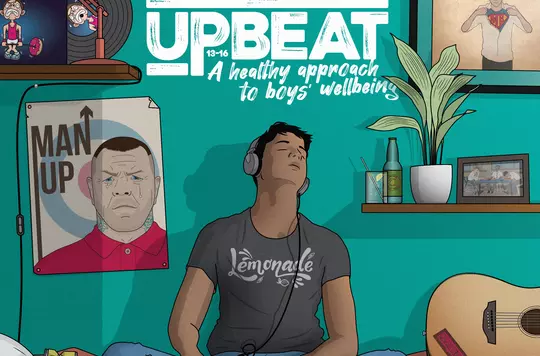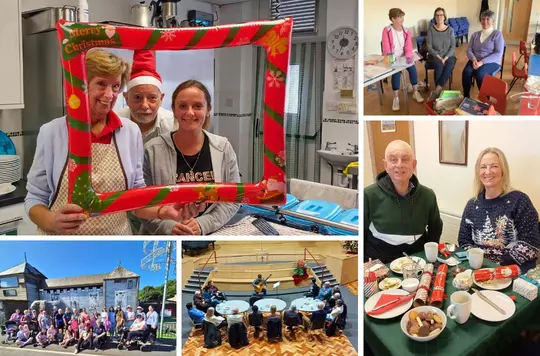7 December 2024
No One Alone: A call to connection
George Tanton

Andrew Wileman speaks to George Tanton about the Army’s No One Alone project.
In 2023, more than 12,000 recorded interactions at corps across the territory involved individuals struggling with loneliness or social isolation. Seeking to rectify this, the Army’s No One Alone project is encouraging corps and centres to engage in opportunities for greater local social cohesion.
Andrew Wileman is the assistant director of Older People’s Services. He is also the policy lead for No One Alone, a member of the national working group for the Campaign to End Loneliness and has a seat on the All-Party Parliamentary Group for Tackling Loneliness and Connected Communities. He believes that society faces an epidemic of loneliness, which he describes as ‘a landscape of relational poverty sweeping the nation’.
The reasons for loneliness are numerous and complex. Unemployment, homelessness, unequal social mobility, bereavement, long-term illness, age and disability offer a maelstrom of explanations for the number of reported cases. The fallout of the Covid-19 pandemic has also exacerbated underlying symptoms. This is partly due to the breakdown of social cohesion, the legacy of mandated isolation and distrust between communities.
These issues present a formidable challenge to people’s physical and mental health.
‘The World Health Organization declared that loneliness and isolation are two of the most challenging public health concerns that they’re facing in the foreseeable future,’ Andrew asserts. ‘Research has shown that loneliness can be as bad as smoking up to 15 cigarettes a day!’
‘I think it also presents one of the most important pastoral challenges for the Army and wider Church,’ he adds.
The No One Alone research review, commissioned by the Mission Service in 2022, identifies multiple social groups at particular risk of social isolation and loneliness. These include carers, people with disabilities, LGBTQ+ people, people who have been bereaved, older people, military veterans, people experiencing homelessness, asylum seekers and refugees.
‘Loneliness doesn’t treat people equally,’ remarks Andrew. ‘And it affects far more than older people, for example, people who are financially disadvantaged, or those who live in poor housing with poor access to public transport. These can create a sense of isolation and loneliness that’s really difficult to tackle.
‘We see lots of veterans in our homelessness services. A number of them live with chronic mental health issues, addiction issues or don’t have access to public services. It’s not surprising that some choose not to engage with society. This can breed loneliness and isolation.’
For LGBTQ+ people, Andrew highlights the complex prejudices they face as factors that can contribute to loneliness and social isolation: ‘Social discrimination and stigma can be very isolating for them.’
Certainly, fear can be a significant reason behind why asylum seekers and refugees are particularly vulnerable to experiencing loneliness or isolation.
‘In the current political and social climate, there’s a lot of discrimination and misunderstanding around refugees and asylum seekers,’ he explains. ‘Their experiences can be disorientating, scary and cause further isolation.’
One way No One Alone is encouraging the support of refugees and asylum seekers experiencing social isolation is by opening community cafés, such as the Sunflower Café at Scarborough (featured in the 22 June 2024 issue of Salvationist).
‘It offers culturally sensitive food and a space for displaced people to come together,’ reflects Andrew. ‘They can talk about their homes and their family lives.’
No One Alone resources link to community engagement opportunities such as coffee mornings, volunteering and exercise opportunities and befriending events, as well as signposting to other Army services and age-specific resources. The latter includes Starfish, the Army’s mentoring programme for schools. Indeed, young people have been identified by the Army’s No One Alone research as a vulnerable demographic, which Andrew explains is partly due to the polarisation of society on social media.
‘We’re becoming increasingly connected through social media, yet feeling lonelier than ever, and social media can create a disturbing narrative of isolation,’ he asserts. ‘Our research tells us that people aged 18 to 25 are perhaps the largest and fastest growing group of people experiencing loneliness.’
Algorithms and divisive social media influencers are considerably affecting vulnerable young men, Andrew adds: ‘They argue that the world has left them behind, that society is against them and that they should isolate themselves and be “their own man”.’
This is why No One Alone signposts to the Army’s Upbeat resource, which helps boys aged 13 to 16 develop healthier approaches to emotional wellbeing.
For Andrew, the Movement – and indeed the wider Church – is in a prime position to help build a cohesive society.
‘The Church is a profound player and practitioner in tackling loneliness and isolation,’ he asserts. ‘I feel very strongly that it’s time for The Salvation Army to raise our voice. We’ve got to put our flag in the sand and say, “We’re right here!”’
Written by

George Tanton
Editorial Assistant
Discover more

Learn more about the topic and how this relates to our work at The Salvation Army.

A healthy approach to boys' wellbeing, Upbeat helps 13-16 year old young men develop their emotional literacy.

Lyn Woods finds out how corps and centres are tackling loneliness and isolation in their communities.
